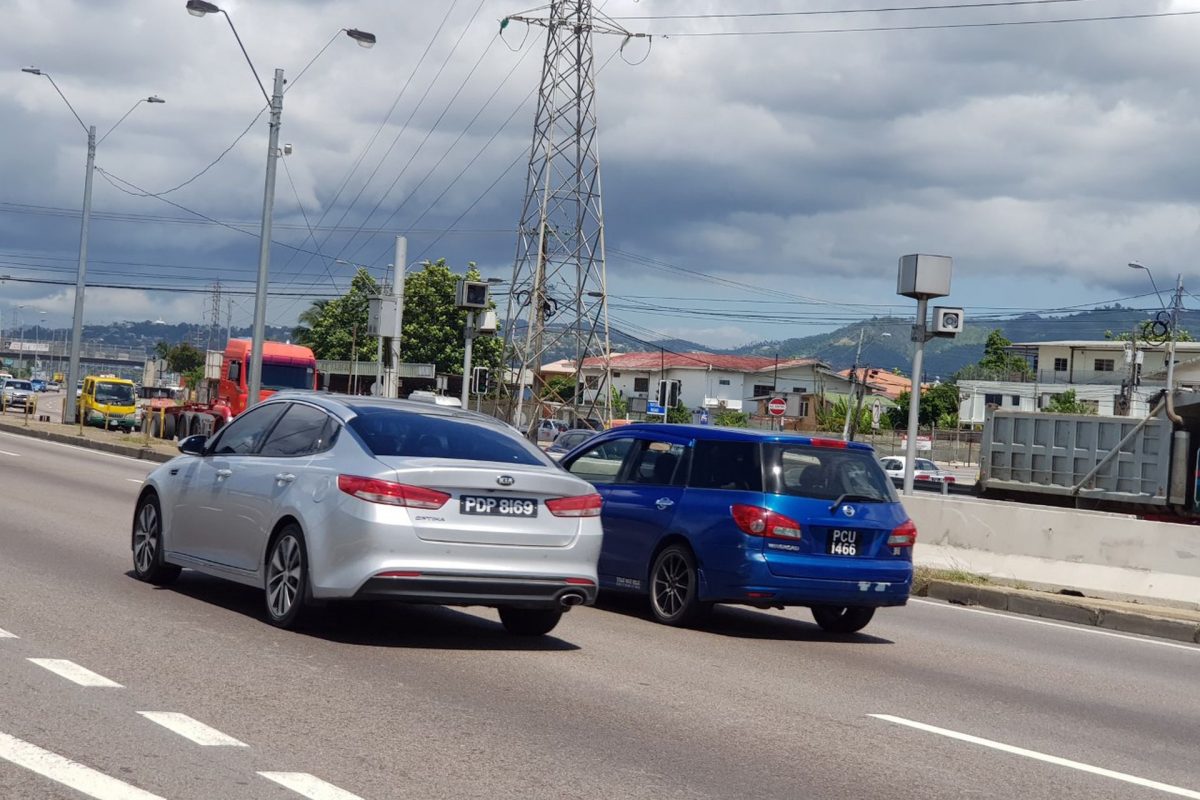(Trinidad Guardian) The Judiciary of T&T has collected $170.9 million in fines paid by errant and delinquent drivers who committed traffic offences and violations between 2011 and 2015 on the nation’s roads.
This startling figure does not include the 120,489 tickets that remained unpaid in the courts for this same period, which currently represents millions of dollars in outstanding revenue for the State.
The amendments to the Motor Vehicle and Road Traffic Act of 2017, which are expected to be proclaimed next month, would see the introduction of new road laws and measures that will see the Government mashing the brakes on reckless, careless and delinquent drivers.
The implementation includes the use of speed spot cameras, penalties for late payment of tickets, red light cameras and law enforcement officers using handheld devices to issue electronic tickets. In addition, tickets will no longer be paid at the courts and motorists can have their driver’s permits suspended.

On Tuesday, Head of Legal Services at the Ministry of Works and Transport Marvin Gonzales described these new measures as the u-turn system of evolutionary enforcement for the 700,000-plus motorists who use the nation’s roads.
Fines to be paid at TTPost
Statistics from the Judiciary showed the total revenue collected on traffic offences and violations in the courts for the five-year period stood at $170,922,332. The number of tickets paid stood at 172,769 compared to the 289,140 tickets that were handed out by law enforcement officers.
At the end of the 2017/2018 law term, the Judiciary stated that the total number of new cases filed in the courts were 165,154, of which 102,875 were traffic cases.
The current system requires motorists to pay their ticket fines in the court.
In many cases, a ticketed driver would have to go to a magistrate’s court in the district where the ticket was issued to pay the fine, which is frustrating and time-consuming.
Another reason that prevents drivers from paying, Gonzales said, are the existing problems in the Judiciary.
“The system in the Judiciary has not been improved over the years. It remains archaic…it does not allow for the convenience of paying fines. So the cases go into a cycle of adjournments before it is eventually discharged or disposed of by a magistrate,” he said.
“While this is happening, you have new files as a result of new tickets on a daily basis. Our focus is the number of unpaid tickets. If this is allowed to continue with the introduction of automated enforcement it would cause some serious distress to the Judiciary in T&T.”
Apart from Government losing millions of dollars in unpaid tickets, Gonzales said the current system was a waste of the court’s resources and law enforcement’s time. Under the proposed fixed penalty ticketing system, Gonzales said starting next month, drivers would be required to pay their fines at TTPost outlets and on its online platform, which would bring about major improvements and faster service in this new payment system.
Transport Commissioner can suspend a driver’s permit
The Government has also introduced escalated fees for offenders who refuse to pay their tickets within 30 days.
“If the fixed penalty is for a fine of $1,000 and the 30 days have elapsed, the fine will escalate by 25 per cent,” Gonzales said.
The offender would have to pay $1,250 in 15 days. If the ticket still remains unpaid, Gonzales said, the fine would increase by an additional 25 per cent in 15 days, taking the fee to $1,500.

If fines are not paid, the Transport Commissioner would have the power to suspend the violator’s licence.
“So what we have done is to remove the jurisdiction of the court for unpaid tickets and have those matters dealt with on an administrative basis at the level of the Transport Commissioner, so the courts will not be overwhelmed by persons simply just not wanting to pay their tickets,” Gonzales said.
Action will only be taken by the court if a driver files in 15 days a “notice to contest,” thereby requesting a court hearing into their matter. These are the only matters that will be heard in the courts.
96,000 drivers speed, run red lights annually
Data from the TTPS showed that from 2010 to 2017, there were 1,314 road fatalities while 1,130 traffic accidents were recorded. Figures revealed that 55 per cent of vehicular accidents were caused by speeding, followed by alcohol consumption with 30 per cent. No seat belts and running a red light were listed at seven and five per cent respectively.
To help reduce the number of deaths on the nation’s roads, measures will be implemented using the red light and speed spotlight cameras throughout the country.
Statistics revealed that on an annual basis, 96,000 drivers break the law by speeding and driving through a red light.
Examining the figures, Gonzales said in each category—speeding and breaking a red light—there were 4,000 violations a month. These violations were detected at Wrightson Road, El Socorro and Trincity where cameras were installed but have not been operational.
In the coming weeks, these cameras will begin to capture images of drivers who do not comply with traffic laws.
Citation notices via mail service
Before year’s end, 15 additional speed spot cameras will be installed at various locations to monitor delinquent drivers.
These cameras will be hooked up to the recently formed Traffic Enforcement Centre (TEC) at Licensing Division, Caroni, which will be manned by a team of 22 workers to pick out drivers who breach the law.
Once a violation has been committed a citation notice will be hand-delivered to the owner of the vehicle by a TTPost worker at his/her address. If the owner cannot be found, the notice will be returned to TEC and their name will be published in the newspaper.
Another critical component of the legislation is the Demerit Point System (DPS), which gives drivers penalty points for traffic violations and offences committed which could result in their drivers’ permits being suspended.
- A driver who acquired his licence 12 months or less can have his/her driver’s permit suspended for one year if seven points are attained in a year’s time.
- A driver who has been in possession of his/her licence more than 12 months will face a six-month withdrawal of a permit if he/she acquires more than ten but less than 14 points.
- Should the points exceed 14 but are less than 20, the suspension moves to one year, while a two-year suspension will go into effect if more than 20 points are accumulated.
- Failure to produce a vehicle for inspection can earn a driver nine points.
Before a permit is re-issued to the offending driver, Gonzales said they must participate in a rehabilitation programme and have their driving regulations redone. However, he said a court can permanently disqualify someone from driving based on the number of offences committed over a period of time. The points are expunged if the driver’s record remains clean for two years.
“What this legislation has done is to make it a condition for a person to obey all the provisions of the Motor Vehicle and Road Traffic Act in order to hold their driver’s permit,” he said.
Minister can heighten system for Carnival, Easter
During heightened seasons such as Carnival, Christmas and Easter, Works and Transport Minister Rohan Sinanan has the power to double the demerit points on some violations, such as driving under the influence, breaking a red light and speeding over the stipulated 100 and 65 kilometres per hour for light and heavy drivers.
The act states drivers who exceed the speed limit by one to nine km per hour will have to pay $1,000.
Exceeding the speed limit by ten to 20 km per hour, 21 to 30 and 31 km or more will see violators being fined $1,500, $2000 and $3,000 respectively.
“This will make drivers exercise extreme caution on the roads during those periods. So, the faster you drive the more you will pay in fines which will attract more demerit points,” Gonzales said.
Gonzales said the DPS will ensure that the Licensing Division is empowered with empirical data to determine the suitability of drivers. “This is not a system of penalising people but ensuring the safety of our roads and to track the behaviour of drivers. The more points you have on your record it indicates the type of driver you are.”
New licence plates, handheld devices coming
Meanwhile, Attorney General Faris Al-Rawi is expected to introduce another piece of legislation soon to implement a new licence plate system that will carry a radio frequency identification feature for tagging of vehicles for effective traffic management and to assist law enforcement officers in efficient investigation of crimes, as well as the illegal manufacture of licence plates.
The coming on stream of 300 handheld devices supplied by the ministry will be used by law enforcement officers. The devices will be connected to the courts, T&T Police Service and Licensing Division.
“A law enforcement officer can scan the bar code on a driver’s permit and all their information will automatically come up. This would include any outstanding warrant/s a driver may have. It will also reveal if a motorist’s license has been suspended,” Gonzales said.
“The intention of this device is to move away from the ticket books and paper-based system to a fully digital system…electronic ticketing. I am confident when these pieces of legislation are operationalised next month we would recognise the implications and consequences of driving and breaching the laws.”
Polygraph tests for TEC workers
In the next six weeks, the Traffic Enforcement Centre (TEC) will also be operationalised.
The man sitting in the driver’s seat of this organisation, which was approved by Cabinet, is coordinator Adrian Winter.
TEC will be working with a staff of 22, comprising red light processing analysts, DPS analysts, fixed penalty/citation analysts and spot speed analysts, who will work closely with the Judiciary, TTPS and TTPost in enforcing the new laws.
Winter said each analyst went through intense training, questioning and examinations.
“They were also subject to polygraph tests to maintain the integrity and confidentiality of the system. The staff at the centre will have access to confidential information…that is the driving record of every person in Trinidad and Tobago, which has to be protected at all costs,” Winter said.
In the line of duty, the workers will face sporadic polygraph tests as well, Winter said.
The role of the analysts is to monitor their computer screens, which will be hooked up to the ministry’s spot speed and red light cameras, that will capture images of drivers who either break a red light, exceed the speed limit or drive in a reckless or dangerous manner.
Once a driver commits an infraction, they will be issued with a citation notice to pay a fine within a stipulated time.
The Demerit Point System
- Driving under the influence of a drug—9 points.
- Driving or being in charge of a vehicle while blood alcohol levels exceeds the prescribed limit—9 points.
- Careless or dangerous driving—6 points
- Driving on the bus route with an unauthorised vehicle—a $2,000 fine and 6 points.
- Drivng while disqualified from holding or obtaining a driving permit—14 points
- Driving a vehicle with a child in the front seat who is five years and under—4 points
- Failing to place a child who is five years and under in a child restraint or booster seat while driving—4 points.
- Motor racing and speed trials between motor vehicles without permission—6 points.






